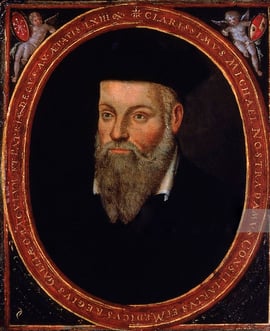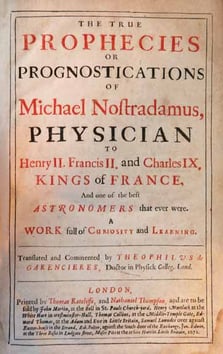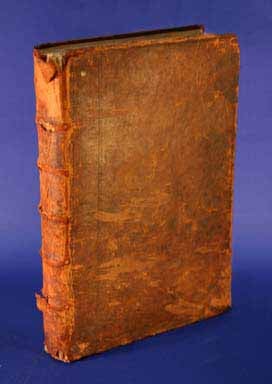Michel de Nostradame, more commonly known by the Latinised Nostradamus, is arguably the most famous psychic in history. He is best known for his book of poetic quatrains, Les Prophéties, each of which is said to predict figure events. According to believers, his quatrains have predicted numerous key events throughout history, such as The Great Fire of London, the rise of Adolph Hitler, the bombing of Hiroshima and Nagasaki, the Kennedy assassination, and the 9/11 terrorist attacks. But what many people don't realize is that while Nostradamus may be best known as a seer and prognosticator, he began his career as a scholar and apothecary. How did someone previously dedicated their life to academic pursuits become one of the most-known figures in mysticism and the occult? Let's take a closer look at the life of Nostradamus as we explore this question.
 Nostradamus was born Michel de Nostradame in 1503 in Provence, France. While his family had been predominantly Jewish before his birth, they converted to Catholicism one generation prior, a change that would be key in Nostradamus' success with Henry II, who was famously devout in his Catholicism and persecution of Protestants. He entered the University of Avignon at the age of fourteen to study grammar, rhetoric, and logic. When the plague broke out at the university, he was forced to leave and pursue his education elsewhere. He elected to travel the countryside researching herbal remedies, a practice that led to his interest in apothecary work, which would cause problems when he later entered the University of Montpelier to study medicine. He was eventually expelled for his work as an apothecary, which was at the time considered a manual trade unworthy of those seeking to train as physicians, and also for allegedly slandering doctors to others. While he never officially graduated and achieved the formal title of “doctor,” his patients and future publishers referred to him as such after he resumed his work as an apothecary and gained considerable fame for inventing a rose pill that was said to be effective at treating plague.
Nostradamus was born Michel de Nostradame in 1503 in Provence, France. While his family had been predominantly Jewish before his birth, they converted to Catholicism one generation prior, a change that would be key in Nostradamus' success with Henry II, who was famously devout in his Catholicism and persecution of Protestants. He entered the University of Avignon at the age of fourteen to study grammar, rhetoric, and logic. When the plague broke out at the university, he was forced to leave and pursue his education elsewhere. He elected to travel the countryside researching herbal remedies, a practice that led to his interest in apothecary work, which would cause problems when he later entered the University of Montpelier to study medicine. He was eventually expelled for his work as an apothecary, which was at the time considered a manual trade unworthy of those seeking to train as physicians, and also for allegedly slandering doctors to others. While he never officially graduated and achieved the formal title of “doctor,” his patients and future publishers referred to him as such after he resumed his work as an apothecary and gained considerable fame for inventing a rose pill that was said to be effective at treating plague.
 It wasn't until after a visit to Italy that he began to move away from medicine and toward the occult. Upon seeing the success many occultists achieved in the country due to the popularity of their almanacs, he decided to try his hand at the genre. His almanac was so well received that he decided to follow up with a new book of predictions each year. It was because of the success of these almanacs that people became interested in seeing further predictions from him, more along the lines of psychic predictions and horoscopes rather than weather and other such phenomena as were typically detailed in his almanacs. He never professed to be an actual psychic, requesting that his clients provide their birth charts from trained astrologers rather than graphing them on his own as he was prone to errors in calculation, but his reputation soon spread.
It wasn't until after a visit to Italy that he began to move away from medicine and toward the occult. Upon seeing the success many occultists achieved in the country due to the popularity of their almanacs, he decided to try his hand at the genre. His almanac was so well received that he decided to follow up with a new book of predictions each year. It was because of the success of these almanacs that people became interested in seeing further predictions from him, more along the lines of psychic predictions and horoscopes rather than weather and other such phenomena as were typically detailed in his almanacs. He never professed to be an actual psychic, requesting that his clients provide their birth charts from trained astrologers rather than graphing them on his own as he was prone to errors in calculation, but his reputation soon spread.
At the height of the popularity of his almanacs, he decided to expand his occult practices and create what came to be his most famous work: his book of quatrains, Les Prophéties. While the book was released to mixed reviews, with some people calling him evil, immoral, and even insane, Nostradamus did manage to secure one important fan: Catherine de Medici, a member of the ruling family of Italy and wife to Henry II, king of France. After reading his almanacs, she hired him to create horoscopes for her children and named him as chief physician to her son. Her patronage and the fact that he never practiced magic alongside his almanacs and prognostication kept him from being targeted by the church, though he was briefly imprisoned in 1862 for failing to secure papal support for that year's almanac. He passed away in 1566, famously predicting his death the day before.
 So why did Nostradamus make the shift from medicine to the occult? The most common theory seems to be money. He never stopped practicing medicine, and serving the queen and others, but most of his wealth came from the fame of his predictions and the patronage of the crown secured by the strength of his almanacs. While his current supporters consider him to be one of the finest psychics ever to exist, modern scholarship debunks allegations of his occult powers. Many of his predictions were sourced from older works, which was not a damning fact when he was writing in the 16th century, as notions of plagiarism did not exist at the time. Even though many of Shakespeare's most famous plays were inspired by other stories, the sharing and reworking ideas was commonplace in the 1500s. However, as the scholarship of Nostradamus grew, these commonalities and borrowed predictions were discovered, as were his letters in which he asserts time and time again that the terms “psychic" and “prophet" may apply to others, but they certainly did not describe him. The accuracy of his predictions is most often attributed to retroactive clairvoyance or the idea that predictions can be vague enough to apply to anything or that some events are merely inevitable based on the course progression of the world and the nature of humans. Much like fortune cookies, the text can bent to fit almost anything and anyone.
So why did Nostradamus make the shift from medicine to the occult? The most common theory seems to be money. He never stopped practicing medicine, and serving the queen and others, but most of his wealth came from the fame of his predictions and the patronage of the crown secured by the strength of his almanacs. While his current supporters consider him to be one of the finest psychics ever to exist, modern scholarship debunks allegations of his occult powers. Many of his predictions were sourced from older works, which was not a damning fact when he was writing in the 16th century, as notions of plagiarism did not exist at the time. Even though many of Shakespeare's most famous plays were inspired by other stories, the sharing and reworking ideas was commonplace in the 1500s. However, as the scholarship of Nostradamus grew, these commonalities and borrowed predictions were discovered, as were his letters in which he asserts time and time again that the terms “psychic" and “prophet" may apply to others, but they certainly did not describe him. The accuracy of his predictions is most often attributed to retroactive clairvoyance or the idea that predictions can be vague enough to apply to anything or that some events are merely inevitable based on the course progression of the world and the nature of humans. Much like fortune cookies, the text can bent to fit almost anything and anyone.
However, psychic or not, and regardless if he was just in it for the money, Nostradamus' historical significance and place in the 16th-century zeitgeist can't be denied. There's a reason why he continues to make the front page of grocery store check-out line tabloids and often features in modern pop culture. There is just something fascinating and alluring about imagining Nostradamus staring into the flame and predicting all of the events that shape and change our world.









